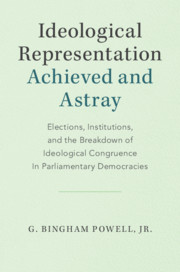
- Cited by 7
-
Cited byCrossref Citations
This Book has been cited by the following publications. This list is generated based on data provided by Crossref.
Lisi, Marco and Serra-Silva, Sofia 2021. Politicians in Hard Times. p. 313.
Devine, Daniel and Ibenskas, Raimondas 2021. From convergence to congruence: European integration and citizen–elite congruence. European Union Politics, Vol. 22, Issue. 4, p. 676.
Kleine, Mareike Arregui, Javier and Thomson, Robert 2022. The impact of national democratic representation on decision-making in the European Union. Journal of European Public Policy, Vol. 29, Issue. 1, p. 1.
Just, Aida 2022. Partisanship, Electoral Autocracy, and Citizen Perceptions of Party System Polarization. Political Behavior,
Costello, Rory 2022. How does the composition of the European Parliament shape its role in EU decision-making?. Journal of European Public Policy, Vol. 29, Issue. 1, p. 117.
Kemahlioğlu, Özge and Dikici Bilgin, Hasret 2022. Congruence in Proportional Representation Systems: Non‐Economic Issue Salience and Coalition Formation. Swiss Political Science Review, Vol. 28, Issue. 3, p. 433.
Dalton, Russell J. and Berning, Carl C. 2022. Rechtspopulismus in Deutschland. p. 13.
- Publisher:
- Cambridge University Press
- Online publication date:
- May 2019
- Print publication year:
- 2019
- Online ISBN:
- 9781108699785




